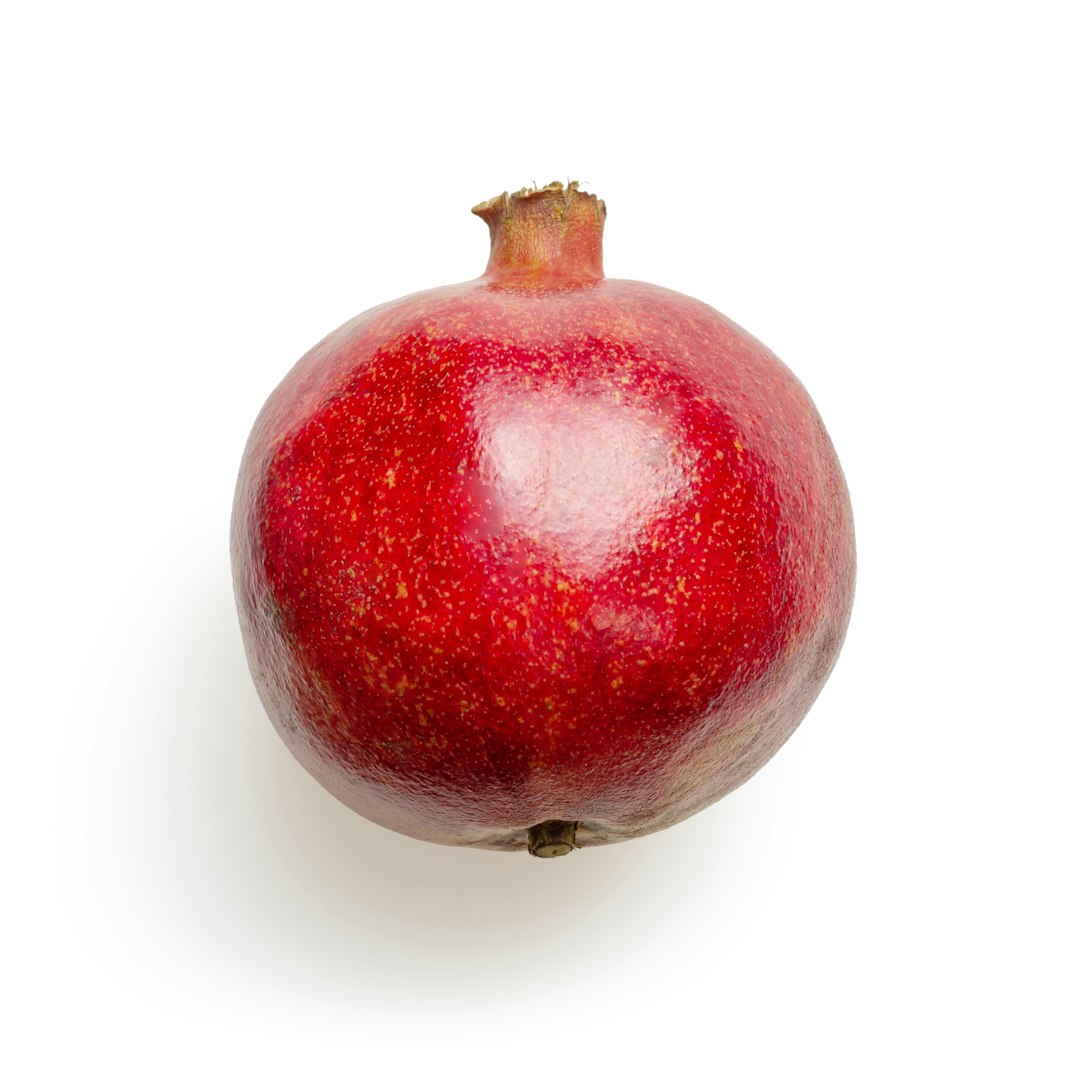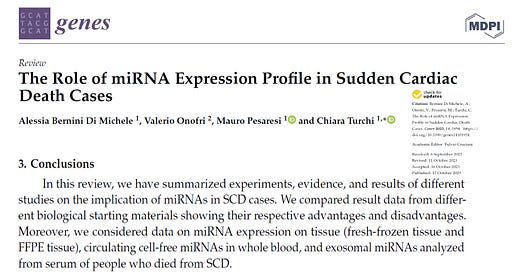microRNA imbalances seen in sudden cardiac death; via Peter McCullough; pomegranate & citrus peel might help modulate miRNA imbalance.
Why wait for the autopsy when you might be able to prevent the sudden death?
Dr. McCullough shares specific recommendations for what to include in an autopsy for sudden death victims. The microRNA balance can/may help differentiate between a sudden death due to cardiac arrest and one due to cardiac arrhythmia. microRNA have regulatory control over gene expression.
Background info: Health conditions can show patterns of up or down regulation of specific types of microRNA (called miRNA or miR in naming systems). Plant polyphenols can modulate microRNA expression in ways that restore healthy function.
miRNAs Used in Autopsy Cases after Cardiac Arrest, by Peter A. McCullough, Nov 10, 2023, (Substack).
Previous research studies have found 69 microRNA that have either an increased or decreased level in patients who had died of Sudden Cardiac Arrest. The data is available in a downloadable Supplementary spreadsheet. (Bernini Di Michele, et al., 2023)

The miRNA mentioned in the highlighted screenshot (samples of blood are evaluated for “cell free” microRNA expression and samples from heart tissue as “tissue expressing”):
miRNA-499a-5p - tissue expressing miRNA-499a-5p had increased levels
miRNA-133a - cell free miRNA-133a had increased levels
miRNA-208b - cell-free and tissue expressing miRNA-08b had increased levels
miRNA-221 - cell free miRNA-221 was decreased while tissue expressing miRNA-221 was increased.
miRNA-1 - cell-free and tissue expressing miRNA-1 had increased levels.
See the Supplement Table S2. List of identified differentially expressed miRNA with their fold-change, (Bernini Di Michele, et al., 2023)
Dr. McCullough is sharing the study as potentially helpful for use with autopsies of sudden death victims.
I would suggest we also can look at the data as useful for identifying therapeutic phytonutrients. Polyphenols and other phytonutrients can reset microRNA imbalance.
See the research article discussed in this post: microRNA are the real regulators of gene transcription. (Substack) and also microRNA, RNA, CoV and Cancer (Substack)
microRNA are the real regulators of gene transcription.
MicroRNA are non-coding short lengths of nucleotides (19-23 nucleotides) that have regulatory control over whether an mRNA will be transcribed into a protein or degraded by the cell. MicroRNAs affect specific mRNA and their proteins but may be able to affect 100s of them so it is not a simple thing to study or to say miRNA type A does this one specific …
Polyphenols that affect microRNA can make adjustments in gene expression that helps correct for a dysfunctional gene allele. Knockout mice for ApoE were compared with wildtype mice for microRNA expression changes caused by treatment with 9 different polyphenols. The mice each got all the polyphenols for a certain length of time so they were self-controls too.
The excerpt below was one paragraph and I modified the format for clarity and emphasis.
“One interesting observation was that polyphenols modulated the expression of miRNA in the livers of apoE−/− mice towards the expression profile that has been observed in wild-type ones.
miRNAs in cluster A (Figure 2) were identified as having their expression down-regulated by polyphenols. The same miRNA were also identified as differentially expressed after mutagenesis in apoE, however their expression was identified as up-regulated.
We could propose that regarding this observation, up-regulation induced by apoE mutagenesis is thwarted by polyphenols to approach the expression in wild-type.
For example, mmu-miR-374* is up-regulated after mutagenesis in apoE mice by a factor of 2.96 comparing to the wild-type mice, however when supplemented by polyphenols, this miRNA is down-regulated in apoE by an average factor of −2.44.
The same observation of opposite miRNA expression was also observed for the miRNA that are down-regulated in the liver after mutagenesis and for which an increase in expression was observed after polyphenol supplementation (cluster B in Figure 2). Overall, among 27 miRNA identified as down-regulated by apoE knock-out, expression of 24 of them were up-regulated by at least 1 polyphenol and for 92 that were up-regulated polyphenols down-regulated 68 of them.
This possible capacity of polyphenols to reverse gene expression in apoE mice has been already observed for caffeic acid phenethyl ester (CAPE) [29]. The authors observed up-regulation of NF-κB-related genes in the aorta in apoE−/− mice compared to wild-type mice (C57/B6), the expression of which was observed to be down-regulated in apoE−/− after 22 weeks of CAPE supplementation, expression that was close to that observed in wild-type mice.
»This reverse expression of genes to “wild-type” was associated with significant reduction of aortic atherosclerosis.
Therefore, the capacity of polyphenols to counteract the expression of miRNA induced by apoE mutagenesis could present another mode of the action of polyphenols at the molecular level underlying the beneficial effects of polyphenols.’ (Milenkovic, et al., 2012)
Data from: ‘Supplement table S2 : List of identified differentially expressed miRNA with their fold-change’, (Milenkovic, et al., 2012, Supplementary Table S2)
The numbers are the ‘fold-change’. Positive numbers would be an up-regulated increase in expression and negative numbers a down-regulated decrease.
Expression of microRNA-1 was effected by all of the polyphenols except Narangin.
ID: mmu-miR-1 also had the knockout ApoE-/- genes affected 3.33
mmu-miR-1 was effected by Cafeic acid -2.23 Ferulic acid -2.86 Anthocyanin -2.53 Catechin 7.55 Curcumin -2.99 Hesperidin 3.44 Proanthocyanin 1.13 Quercetin -2.19
Expression of microRNA-133a was effected by some of the polyphenols
ID: mmu-miR-133a was effected by: Catechin 2.53 Curcumin -1.63 Hesperidin 1.81 Narangin -1.58 Proanthocyanin 4.52 But was not affected by: Cafeic acid, Ferulic acid, Anthocyanin, Quercetin
Three or four of those phytonutrients are in citrus peel and a few are in pomegranate peel. Both citrus peel and pomegranate peel or phytonutrients from them are very effective against SARS-CoV2 issues.

Potentially related pomegranate research
“Our results showed that miRNA-23 and miRNA-126 were upregulated by [Pomegranate (Punica granatum) extract] PGE treatment in MSCs, and in contrast, miRNA-21 and miRNA-155 were downregulated by PGE treatment in MSCs. In addition this research shows that PGE can downregulate the expression of PI3K\AKT1\NF-kB in Ad-MSCs.”
Effect of Pomegranate Extract in Mesenchymal Stem Cells by Modulation of microRNA-155, microRNA-21, microRNA-23b, microRNA-126a, and PI3K\AKT1\NF-kB Expression. (Rostami, et al., 2020)
microRNA-23b-3p is decreased in SCD which suggests upregulation by use of pomegranate (Punica granatum) extract would benefit health - if that happened. Pomegranate research has shown benefit for heart and cardiovascular health and other organs, and the brain, and against cancer, and is beneficial for the microbiome. It is a win/win/win/win - with potency deserving caution as too much is an irritant from the tannin content.

Why wait for the autopsy when you can be proactive sooner? The earlier the better for trying to prevent degenerative changes.

Regarding citrus peel against CoV - this was the first of many posts including marmalade jam recipes I worked on that year:
Bitter taste receptors in the lungs & Hesperidin's decongestant properties.
How did citrus peel help my symptoms? In several ways it turns out, potentially. Antiviral actions, decongestant ability within the lungs, and by reducing the risk of blood clot formation within the lungs as the viral load increases and more tissue damage has occurred.
Disclaimer: This information is being provided for educational purposes within the guidelines of Fair Use and is not intended to provide individual health care guidance.
Reference List
(Bernini Di Michele, et al., 2023) Bernini Di Michele A, Onofri V, Pesaresi M, Turchi C. The Role of miRNA Expression Profile in Sudden Cardiac Death Cases. Genes (Basel). 2023 Oct 17;14(10):1954. doi: 10.3390/genes14101954. PMID: 37895303; PMCID: PMC10606010. https://www.ncbi.nlm.nih.gov/pmc/articles/PMC10606010/
(Milenkovic, et al., 2012) Milenkovic, D., Deval, C., Gouranton, E., Landrier, J.F., Scalbert, A., Morand, C., Mazur, A., (2012). ‘Modulation of miRNA expression by dietary polyphenols in apoE deficient mice: a new mechanism of the action of polyphenols’. PLoS One. 7(1):e29837. doi: 10.1371/journal.pone.0029837. Epub 2012 Jan 10. PMID: 22253797; PMCID: PMC3254631. Available at: https://journals.plos.org/plosone/article?id=10.1371/journal.pone.0029837
Effect of Pomegranate Extract in Mesenchymal Stem Cells by Modulation of microRNA-155, microRNA-21, microRNA-23b, microRNA-126a, and PI3K\AKT1\NF-kB Expression. (Rostami, et al., 2020)







Wow! Amazing info. I'm enervated just by reading about these tangent polyphenols and can't wait to make some pomegranate &c tea. Thank everybody!! 🥝🫚🌶️
Thanks for fighting Jen. Happy weekend.